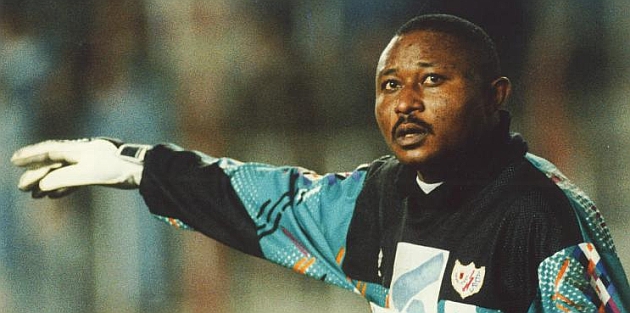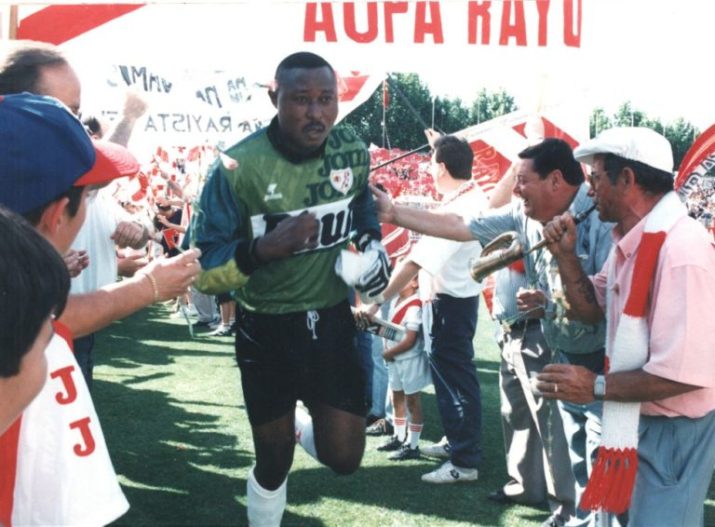Rayo Vallecano and Willie: A love story
For any visitor to Madrid who chooses to attend a game at the Vallecas Stadium, a bit of awareness about where they’re headed is essential. After all, in the same city, two of the planet’s most renowned football teams reside. Yet, even if the decision is made purely by chance, disregarding the option of the more successful Getafe, the first encounter with the stadium is almost certain to convince them that they are in for a unique experience. And if the overall appearance of the stadium doesn’t do the trick, then the sign and graffiti at the entrance of the stand housing the Bukaneros, the organized fans, surely will. What business does the figure of a stocky man and a tongue-twisting name like “Wilfred Agbonavbare” have in a Spanish terrace, you might wonder?
Willy, as he later became known to all, appeared in the Vallecas neighborhood literally out of nowhere in the summer of 1990. Born in Nigeria in 1966, Agbonavbare had managed to stand out from an early age with his performances between the goalposts in the local league, earning him a spot on the national team. However, the amateurism of the domestic league didn’t promise much in terms of a comfortable life. So, when a man suggested that he try out for European teams, Willy didn’t think twice, nor did he fear the unknown. He donned his best smile and went for it.

His physique, the era, and the surrounding circumstances didn’t offer much support. He was slightly overweight, had zero experience outside of Africa, lacked a professional mentor to guide him, and was, notably, black. This was an era when racism reigned both on and off the field. Out of all the trials he underwent in England and Spain, only one team showed interest—a team that didn’t care about his origin. They embraced the slogan (now even inscribed on a mural with Willy’s likeness): “In Vallecas, the only color that matters is the red on the jersey.
However, in contrast to the passion of the fans, Rayo Vallecano didn’t have deep pockets. At the time, they were consistently playing in the second division with minimal success. The contract offer was modest: they would cover his rent for a small apartment in the area and provide him with a minimal salary to make ends meet. Willy, already accustomed to adversity, signed without hesitation. In a very short time, he became the team’s starting goalkeeper. From his very first appearances, it was clear that despite his seemingly unathletic physique and his round cheeks, he had no problem leaping across the goal or diving into the muddy areas that were quite common on the small second division pitches. This determination, combined with his ever-present smile and outgoing personality, endeared him to the fans, who had shown a growing inclination toward embracing diversity.

With Willy putting on outstanding performances in his second season in Spain, Rayo Vallecano secured promotion to La Liga and could finally offer him a proper professional contract. However, this significant change in his financial situation never altered his character. “Willy was the best person we’ve ever known,” claim his teammates. “He was always cheerful and ready to help with any problem, without thinking twice.” According to Kike Peinado’s book about Rayo, Willy’s family was so generous that during the holidays, they invited everyone into their home for a meal, no invitations, no distinctions. “Sometimes, over 50 people would gather at his place because he left the door open. His wife would cook for anyone who came. They were always celebrating something, for anyone who felt like joining the party.”
Despite the team’s success on the field, Agbonavbare never felt like a star. On Sunday nights, he could be facing shots from Romario and Stoichkov at Camp Nou, and on Monday mornings, he’d be casually shopping at the local stores in Vallecas, greeting everyone, striking up conversations with anyone willing to talk. He often traveled by metro, frequented the neighborhood, and helped anyone in need. His acquaintances claim he financially supported double-digit numbers of relatives back in Nigeria. In his free time, he attended youth academy training sessions and assisted young goalkeepers, offering them advice and encouragement. Nearly all the young players who featured for Rayo’s smaller teams during that period have a photo with him. Later on, he became a goalkeeper coach (without pay) for an obscure amateur team in the area.
Fans adored Willy because Willy, despite being theoretically a foreigner, embodied everything Rayo stands for. He played in the way Rayo’s fans wanted, lived and hung out in the same places as Rayo. Willy was Rayo. The love of the people was so profound that chants of “Willy, Willy, Willy” echoed in most home games. During those years, in all the wooden foosball tables around Vallecas, the goalkeeper was always painted black!

Outside the confines of Vallecas, things were far from idyllic for Willy Agbonavbare. Racism in Spanish stadiums was one of the pressing issues of the era, making life difficult for black footballers who were a rarity in the league. Agbonavbare became the target of racist taunts at several stadiums across the country. His position as a goalkeeper made it easier for opposing fans to get close and hurl offensive remarks.
In May 1993, he delivered one of the finest performances of his career at the Santiago Bernabéu. Thanks to him, Rayo Vallecano achieved a remarkable feat, leaving the home ground of their illustrious city rivals with a 1-1 draw. The Nigerian goalkeeper even saved a penalty taken by Michel. The report of that match is indicative of what Agbonavbare experienced in several games. Throughout the game, chants from the Real Madrid fans’ stand frequently included slogans like, “Black man, go pick cotton.” Shockingly, even the television reports of the game caught these racist chants. During the post-match coverage, a journalist asked the viewers for their opinion on the superb performance by the visiting goalkeeper. However, Spain witnessed and heard dozens of young people shouting unchallenged in front of the camera, “Ku Klux Klan” and other nauseating slogans. When Willy was asked to comment on what he had heard, he smiled as always, shrugged his shoulders, and chose not to respond further.
During his six years wearing the Rayo jersey, he amassed nearly 200 appearances, experienced relegation and two promotions, and secured a permanent place in the Nigerian national team, even participating as a backup behind Peter Rufai in the 1994 World Cup. A serious injury during the 1995-96 season sidelined him for several months, causing him to lose his spot in the starting lineup. In the summer of 1996, he decided to try his luck with Écija, a second division club. There, at the age of just 31, he hung up his gloves and disappeared. Just as suddenly as he entered the world of Vallecas, he exited the stage. Fame and stardom never interested him.

For a long time, few knew what became of Willy Agbonavbare, even though he continued to live in a neighborhood near Vallecas. His only public appearance was when the Buccaneers invited him to an anti-racism event, where he was celebrated. However, one day, a television program that conducted interviews with workers in various fields happened to find him working in baggage handling at the airport. As revealed in that interview, life after football was far from easy for him.
Several years after his retirement, his wife was diagnosed with cancer. To assist her, Willy spent what little money he had left from his modest earnings during his professional playing years. When that wasn’t enough, he took up various odd jobs, including working at a gas station, before ultimately ending up carrying luggage at the airport. Sadly, her passing was the one blow he couldn’t endure.
His children returned to Nigeria, leaving him alone to struggle for survival. Shortly after his appearance on television, he was also diagnosed with cancer. This time, he couldn’t keep his health issue a secret. His former teammates and Rayo fans learned about it, and immediately, a fundraising campaign was launched to cover his medical expenses and enable his children to come and see him. The support from the Vallecas community was overwhelming, but it wasn’t sufficient. His health deteriorated rapidly, and on the morning of January 27, 2015, at the age of only 49, Wilfred Agbonavbare passed away in a Madrid hospital, without the chance to bid farewell to his children, who, due to visa issues, arrived in Spain the following day.

Three days later, Rayo Vallecano faced Deportivo La Coruña. Before the start of the match, representatives from both teams placed flowers next to the goal located in front of the section where the Buccaneers sit (a section that, as we’ve seen, bears his name at the entrance and features murals and banners in his memory). Following this gesture, a minute of silence was observed at the center of the stadium. In the midst of absolute quiet, a cry was heard from somewhere in the stands: “Willy!” Immediately, the entire stadium joined in: “Willy! Willy! Willy!” At Vallecas, heroes aren’t defined solely by scoring 200 goals or winning championships and cups. In Vallecas, heroes must be good people.



